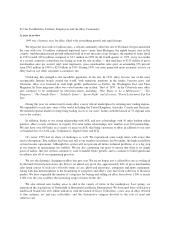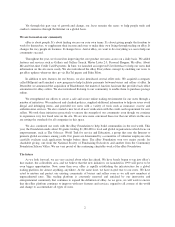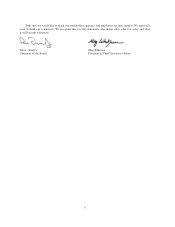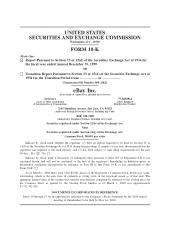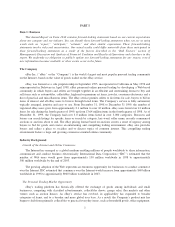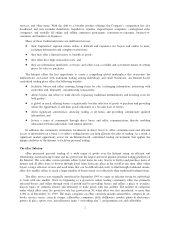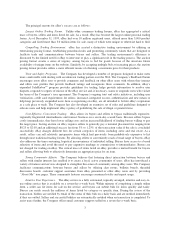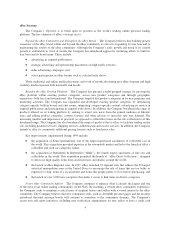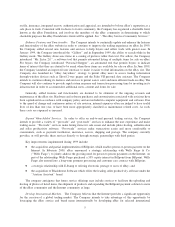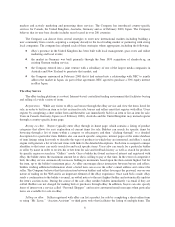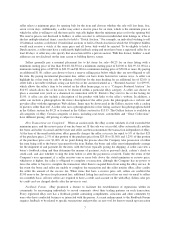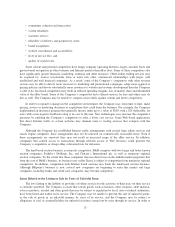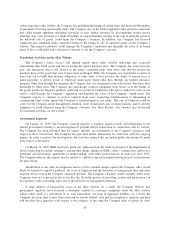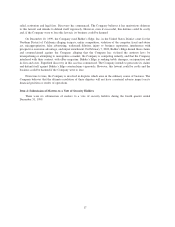eBay 1999 Annual Report Download - page 12
Download and view the complete annual report
Please find page 12 of the 1999 eBay annual report below. You can navigate through the pages in the report by either clicking on the pages listed below, or by using the keyword search tool below to find specific information within the annual report.seller selects a minimum price for opening bids for the item and chooses whether the sale will last three, five,
seven or ten days. Additionally, a seller may select a reserve price for an item, which is the minimum price at
which the seller is willing to sell the item and is typically higher than the minimum price set for the opening bid.
The reserve price is not disclosed to bidders. A seller can elect to sell items in individual item listings or, if he or
she has multiple identical items, can elect to hold a ‘‘Dutch Auction.’’ For example, an individual wishing to sell
10 identical watches could hold 10 individual auctions or hold a Dutch Auction in which the 10 highest bidders
would each receive a watch at the same price and all lower bids would be rejected. To be eligible to hold a
Dutch auction, a seller must have a sufficiently high feedback rating and must have been a registered seller for at
least 60 days. A seller may also specify that an auction will be a private auction. With this format, bidders’ e-mail
addresses are not disclosed on the item screen or bidding history screen.
Sellers generally pay a nominal placement fee to list items for sale—$0.25 for an item listing with a
minimum starting price of less than $10.00, $0.50 for a minimum starting price of $10.00 to $24.99, $1.00 for a
minimum starting price of $25.00 to $49.99 and $2.00 for a minimum starting price of $50.00 or more. By paying
an additional $1.00, sellers can choose to have a reserve selling price below which they are not obligated to sell
the item. By paying incremental placement fees, sellers can have items featured in various ways. A seller can
highlight his or her item for sale by utilizing a bold font for the item heading for an additional fee of $2.00. A
seller with a favorable feedback rating can have his or her auction featured as a ‘‘Featured Auction’’ for $99.95,
which allows the seller’s item to be rotated on the eBay home page, or as a ‘‘Category Featured Auction’’ for
$14.95, which allows his or her item to be featured within a particular eBay category. A seller can choose to
place a seasonal icon (such as a shamrock in connection with St. Patrick’s Day) next to his or her listing for
$1.00. A seller can also include a description of the product with links to the seller’s website. In addition, a
seller can include a photograph in the item’s description if the seller posts the photograph on a website and
provides eBay with the appropriate Web address. Items may be showcased in the Gallery section with a catalog
of pictures rather than text. A seller who uses a photograph in his or her listing can have this photograph included
in the Gallery section for $0.25 or featured in the Gallery section for $19.95. The Gallery feature is available in
all categories of eBay. Certain categories of items, including real estate, automobiles and ‘‘Great Collections’’
have different pricing. All pricing is subject to change.
How Transactions are Completed. When an auction ends, the eBay system validates if a bid exceeded the
minimum price, and the reserve price if one has been set. If the sale was successful, eBay automatically notifies
the buyer and seller via email and the buyer and seller can then consummate the transaction independent of eBay.
At the time of the email notification, eBay generally charges the seller a success fee equal to 5% of the first $25
of the purchase price, 2.5% of that portion of the purchase price from $25.01 to $1,000, and 1.25% of that portion
of the purchase price over $1,000. At no point during the process does the Company take possession of either
the item being sold or the buyer’s payment for the item. Rather, the buyer and seller must independently arrange
for the shipment of and payment for the item, with the buyer typically paying for shipping. A seller can view a
buyer’s feedback rating and then determine the manner of payment, such as personal check, cashier’s check or
credit card, and also whether to ship the item before or after the payment is received. Under the terms of the
Company’s user agreement, if a seller receives one or more bids above the stated minimum or reserve price,
whichever is higher, the seller is obligated to complete a transaction, although the Company has no power to
force the seller or buyer to complete the transaction other than to suspend them from using the eBay service. In
the event the buyer and seller are unable to complete the transaction and the seller notifies eBay, eBay credits
the seller the amount of the success fee. When items that have a reserve price sell, sellers are credited the
$1.00 reserve fee. Invoices for placement fees, additional listing fees and success fees are sent via email to sellers
on a monthly basis. All new sellers are required to have a credit card account on file with eBay. Sellers who pay
by credit card are charged shortly after the invoice is sent.
Feedback Forum. eBay pioneered a feature to facilitate the establishment of reputations within its
community by encouraging individuals to record comments about their trading partners on each transaction.
Every registered eBay user has a feedback profile containing compliments, criticisms and other comments by
users who have conducted business or interacted with the person. A recent enhancement to the Feedback Forum
requires feedback to be related to specific transactions and provides an easy tool for them to match up transaction
7


